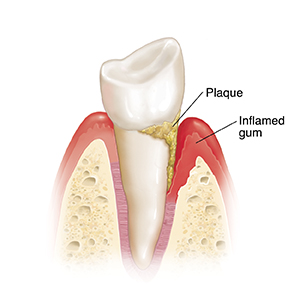Understanding Gingivitis
Gingivitis is a type of gum disease. It is an inflammation of the gums that causes redness and swelling. It’s most often caused by infection from bacteria on the teeth at or slightly below the gumline. A severe infection can cause small painful sores on the gums, bad breath, and bleeding gums. If untreated, gingivitis can lead to a more severe form of periodontal disease called periodontitis. Over time, this can cause tooth loss if not treated.

What causes gingivitis?
Gingivitis is most often caused when plaque builds up on your teeth. Plaque is a sticky film made of bacteria and other substances that coats your teeth. Brushing and flossing helps remove plaque. If you don’t brush and floss regularly, plaque can build up and lead to gingivitis.
You may be at higher risk of developing gingivitis if you:
-
Don’t brush or floss regularly.
-
Smoke or chew tobacco.
-
Are pregnant.
-
Have diabetes.
-
Use medicines, such as birth control pills, steroids, medicines used to treat epilepsy, or cancer medicines.
-
Have family members who tend to get gingivitis.
Symptoms
You may have gingivitis if your gums have areas that:
Treating gingivitis
-
See your dentist regularly. They can clean your teeth and remove buildup on your teeth called plaque and tartar. Tartar is a mixture of plaque and minerals from your saliva, food, and fluids that forms into a hard substance.
-
Use an antiseptic mouth rinse if your dentist tells you to. Follow their directions on how to use it.
-
If your health care provider prescribes antibiotics or other medicines, use them exactly as directed. Don’t stop taking them even if your symptoms go away.
-
Make sure you brush at least twice a day. Floss your teeth at least once a day. This will help remove plaque from your teeth. Flossing helps to remove plaque found under the gums and between the teeth.
-
Eat a soft diet, if needed, to ease discomfort. Don't have food or beverages that may cause more discomfort in your gums. These include citrus juices, such as orange juice and lemonade, and salty or spicy foods.
-
Use acetaminophen or ibuprofen for pain or fever. If you have liver or kidney disease or ever had a stomach ulcer or gastrointestinal bleeding, talk with your provider before using these medicines.
When to call your doctor
Contact your health care provider or get medical care right away if you have:
-
Pain that doesn’t go away or gets worse.
-
Gums that have pulled away from your teeth.
-
A bad taste in your mouth that won’t go away.
-
Teeth that become loose.
-
An inability to eat or drink because of mouth pain.
Online Medical Reviewer:
Daphne Pierce-Smith RN MSN
Online Medical Reviewer:
Rita Sather RN
Date Last Reviewed:
4/1/2025
© 2000-2025 The StayWell Company, LLC. All rights reserved. This information is not intended as a substitute for professional medical care. Always follow your healthcare professional's instructions.